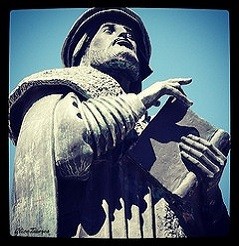Amato Lusitano (Castelo Branco, 1511 - Salonicco, 1568)
A Portuguese Jewish doctor, he taught at the University of Ferrara in the 16th century. One of the greatest figures of medical literary production of the first half of the sixteenth century.
Amato Lusitano was born in 1511 in Castelo Branco, in the province of Beira Bassa, to the Jewish Chabib family (Amatus is the Latinised surname). Forced to convert to Christianity, he studied Medicine and Surgery in Salamanca, then returned to Portugal to practice the profession, but had to flee in 1532 due to the persecutions of the Inquisition against the Marranos. In 1536 he was in Antwerp, where he printed Exegemata in duos priores libros Dioscoridis; after a short stay in Venice, he stayed for seven years in Ferrara. Here, his friendship with Antonio Musa Brasavola (1500-1555), a famous ducal doctor and lecturer in Study Medicine, allowed him to enter the grace of Duke Ercole II (1508-1559) and to teach at the University. Among his pupils was Giovan Battista Canani the Younger (1515-1579), to whom the discovery of the small valves of the veins was for a long time and erroneously attributed, a discovery that was instead due to Amato Lusitano and is exhibited in Centuria 1, curatio 52. From 1549 to 1555 he was in Ancona, where he worked as a doctor and composed the first three Centurie delle Curationes medicinales; in the meantime, he was often summoned to Rome for consultations on the uncertain health of Pope Julius III (1487-1555). His successor Paul IV (1476-1559) was hostile towards the Marrani and Amato was attacked in his environment, especially by the Sienese doctor Pietro Andrea Mattioli (1501-1577), already criticized by the Portuguese in Enarrationes in Dioscoridem (1551). In Thessaloniki in 1559, he could again practice the Jewish faith; he composed the last Centuria, the seventh, and completed the Spanish translation of Eutropius's History of Rome (1561). He died in Thessaloniki in 1568.
Bibliography
- Santoro, Mario, Amato Lusitano ed Ancona, Istituto Nacional de Investigacao Cientifica, Centro de Estudos Classicos e Humanisticos da Universidade de Coimbra, Coimbra 1991
- Arieti, Stefano, Amato Lusitano: un grande clinico del XVI secolo in Medici ebrei e la cultura ebraica a Ferrara, Faust 2014, pp. 52-59
Sitography
Related Themes
Compiling entity
- Istituto di Storia Contemporanea di Ferrara
Author
- Edoardo Moretti
- Sharon Reichel


